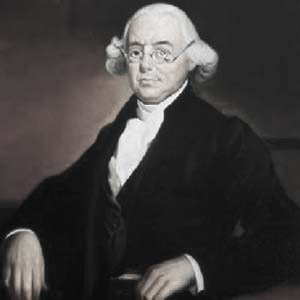Early Life
James Wilson was born on September 14, 1741, in the town of Carskerdo, Scotland near St. Andrew’s. Wilson received a scholarship to the University of St. Andrew’s at age fifteen, and he graduated in 1762. Wilson spent several years after graduation in Scotland before moving to Philadelphia, Pennsylvania in 1766.
Wilson was admitted to the Pennsylvania Bar in 1767, establishing his own practice shortly thereafter. While practicing law in Pennsylvania in the following years for his largely successful firm, Wilson married Rachel Bird. The couple would go on to have six children together.
Revolutionary War & Independence
In 1774, Wilson published a document arguing that the British Parliament had no authority to pass laws governing the colonies. After distributing his work to the first continental congress, Wilson gained renowned for his strong and far-sighted beliefs, helping earn his election to the second continental congress the following year.
Wilson voted for independence with the eventual support of his district, and he went on to sign the Declaration of Independence in 1776. Wilson worked in various endeavors in the following years, including as the Advocate General for France in America from 1779 to 1783 and as one of the directors of the Bank of North America in the early 1780s.
Wilson served as a delegate at the Constitutional Convention in 1787, making a significant contribution in almost all hearings. Among his most notable contributions include the proposition of the Three-Fifths Compromise, in which three-fifths of Southern States’ slave population would count towards electoral votes. Wilson also advocated for a senators and the President to be elected through popular vote.
Supreme Court
Wilson began his term as Associate Justice of the United States Supreme Court on September 26, 1789 after being nominated by President Washington. During his tenure as Associate Justice, the Supreme Court heard only nine cases. Wilson’s previous success as a revolutionary leader did not translate well to the Supreme Court, as he did not live up to his expectations as an Associate Justice.
The most important ruling of Wilson’s career as Justice came in Chisholm v. State of Georgia (1793). Wilson ruled in the majority, giving citizens the right to sue the federal court of another state. However, despite the Supreme Court’s ruling, the Eleventh Amendment passed two years later in 1795 reversed this ruling.
Death and Legacy
Justice Wilson died on August 21, 1798 after suffering a stroke at the age of 55. Wilson’s ideology throughout his professional career can certainly be categorized as revolutionary. Though he garnered much support during the Second Continental Congress and the Constitutional Convention, his opinions were not widely accepted in his later life.
Notable Cases
Hayburn’s Case (1792)
Chisholm v. State of Georgia (1793)
Hylton v. U.S. (1796)
Ware v. Hylton (1796)









